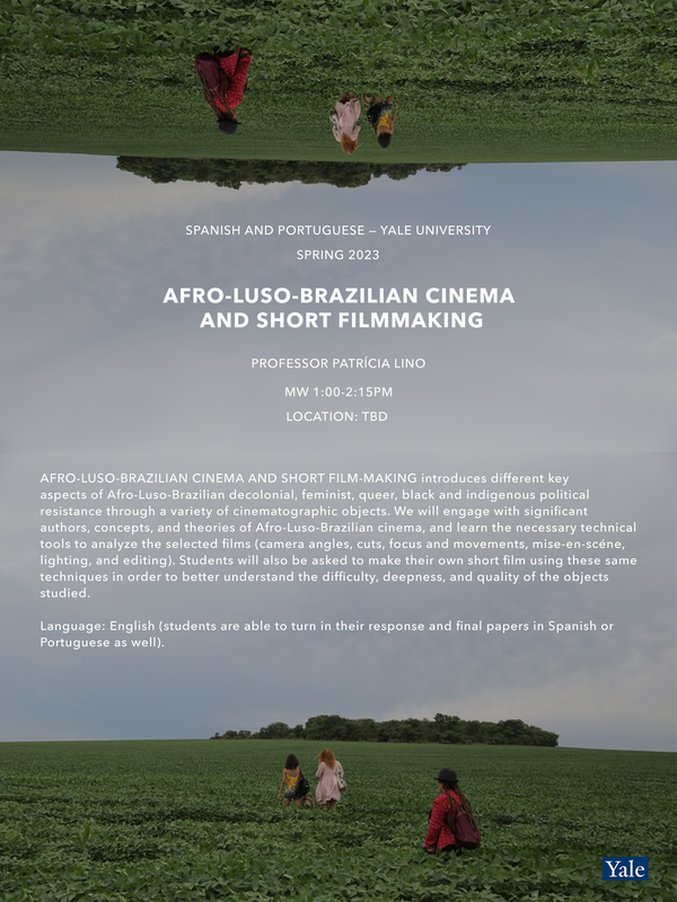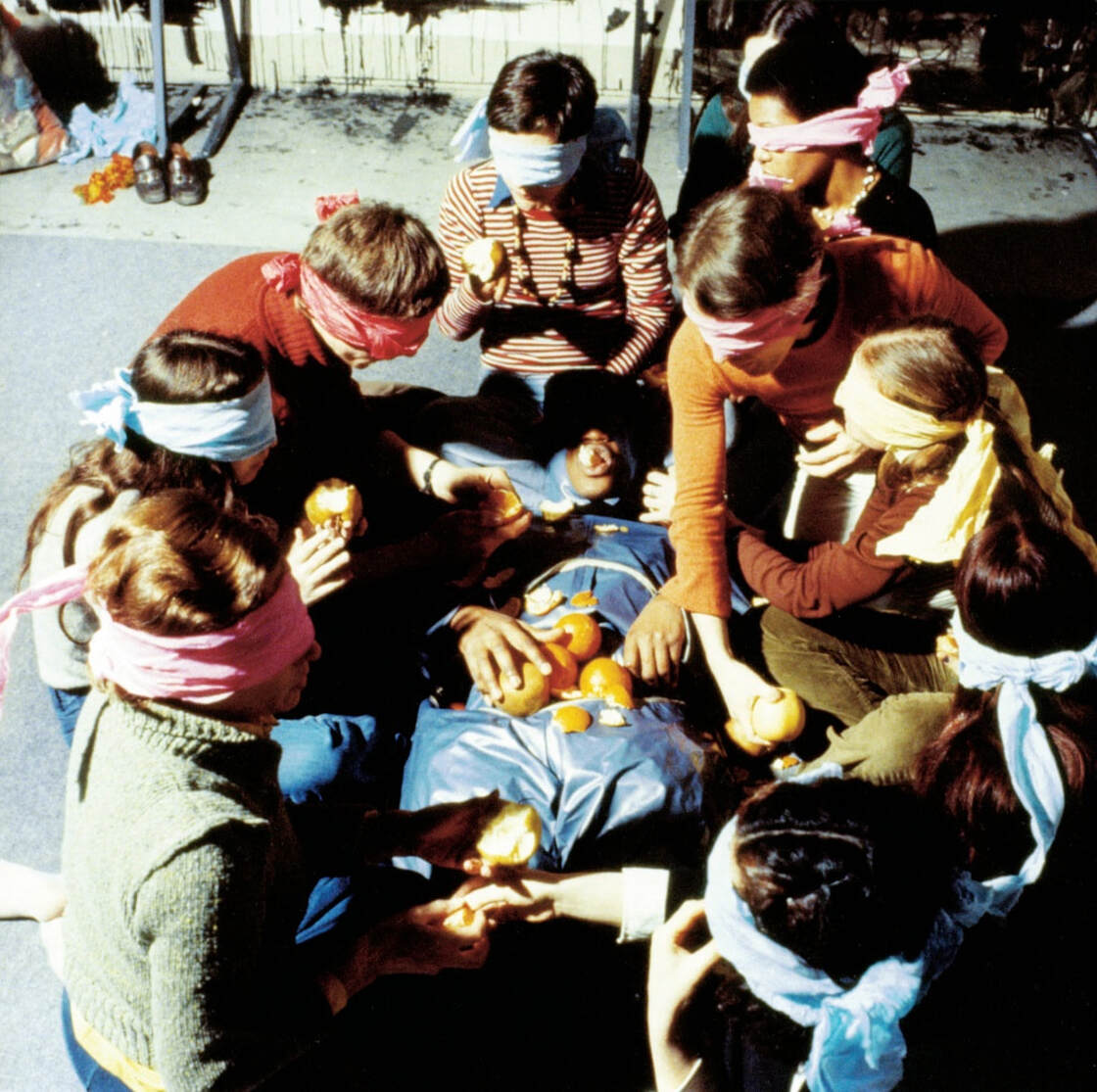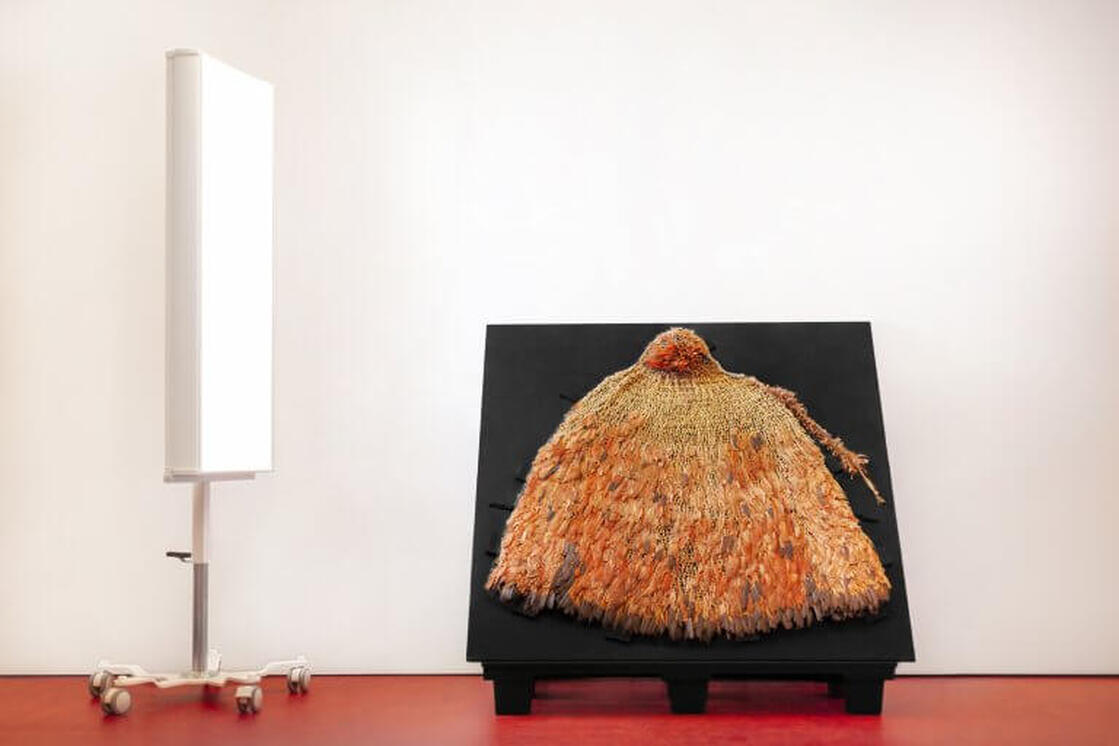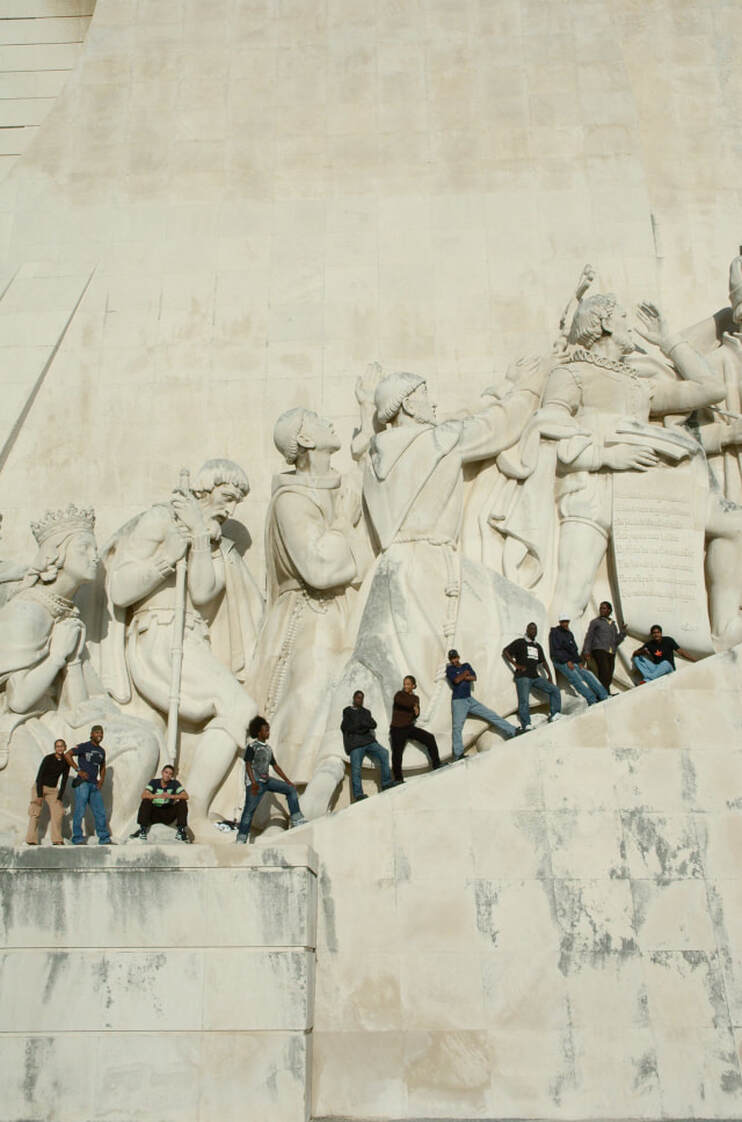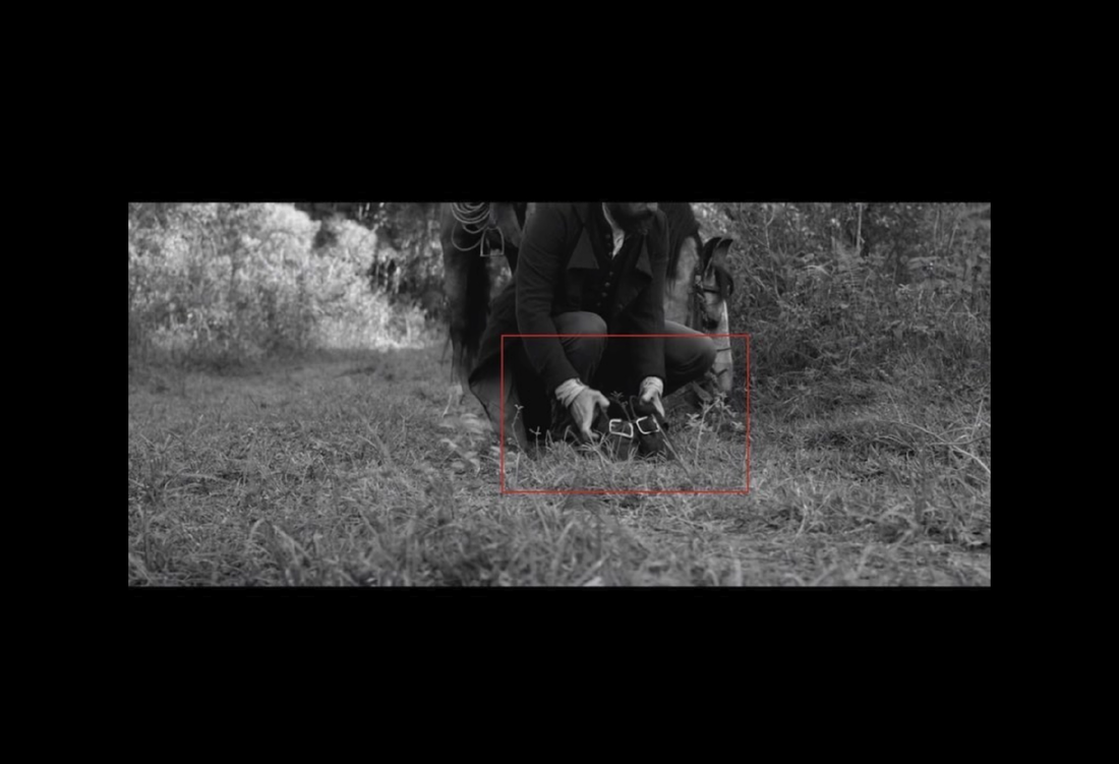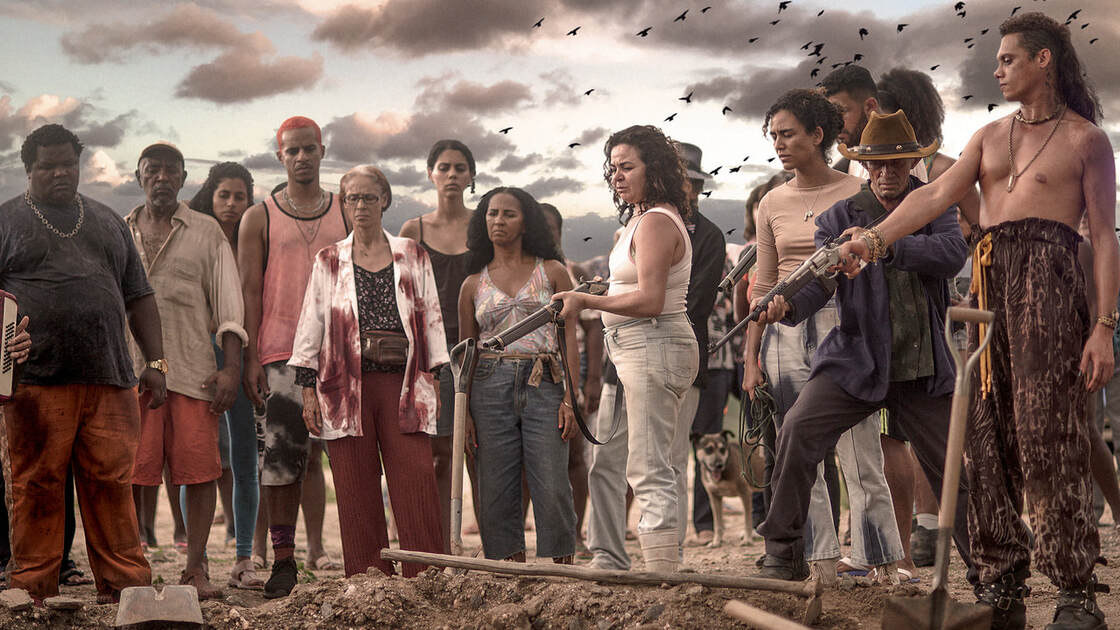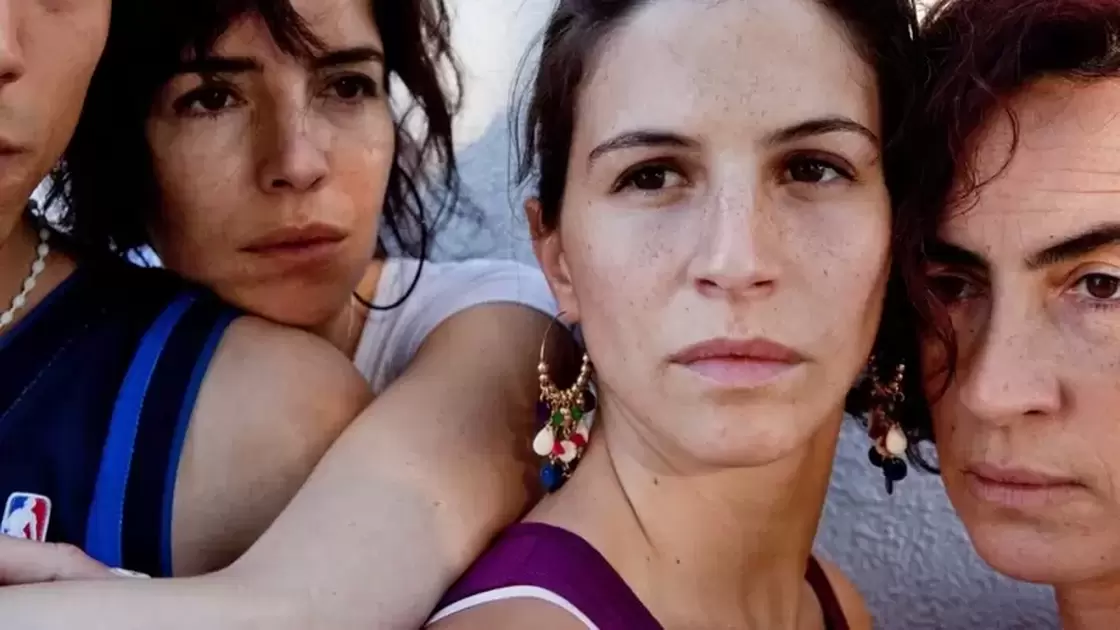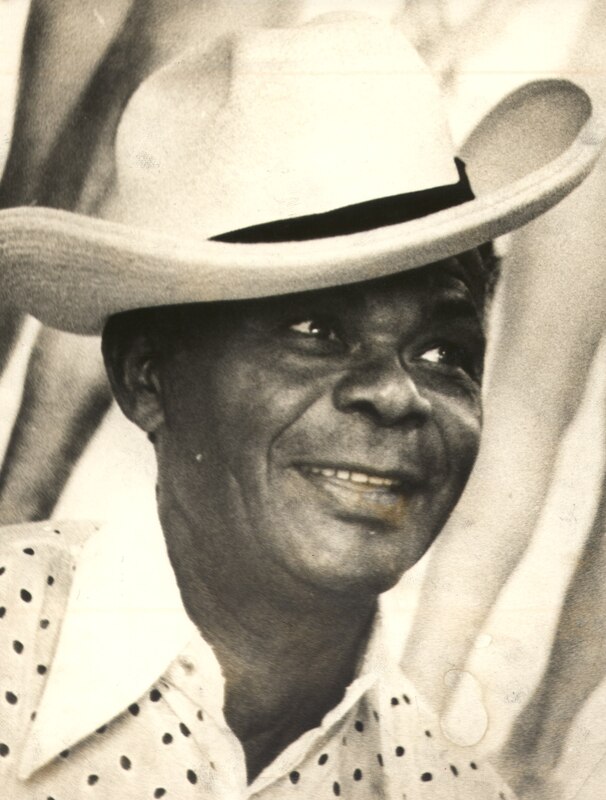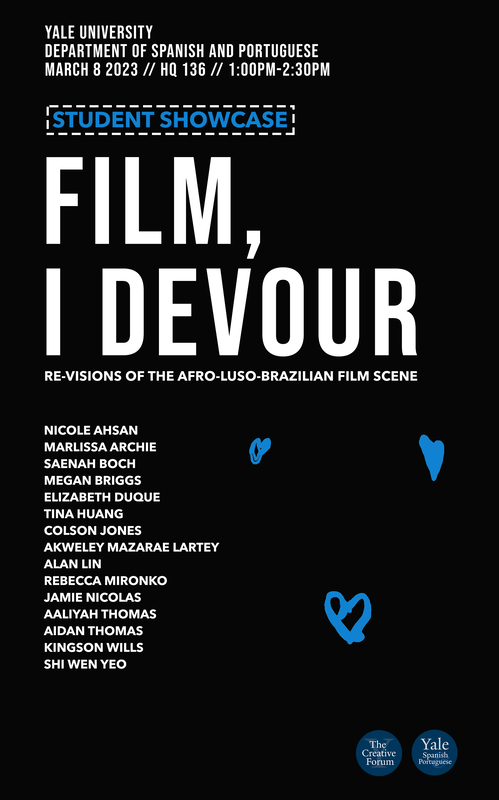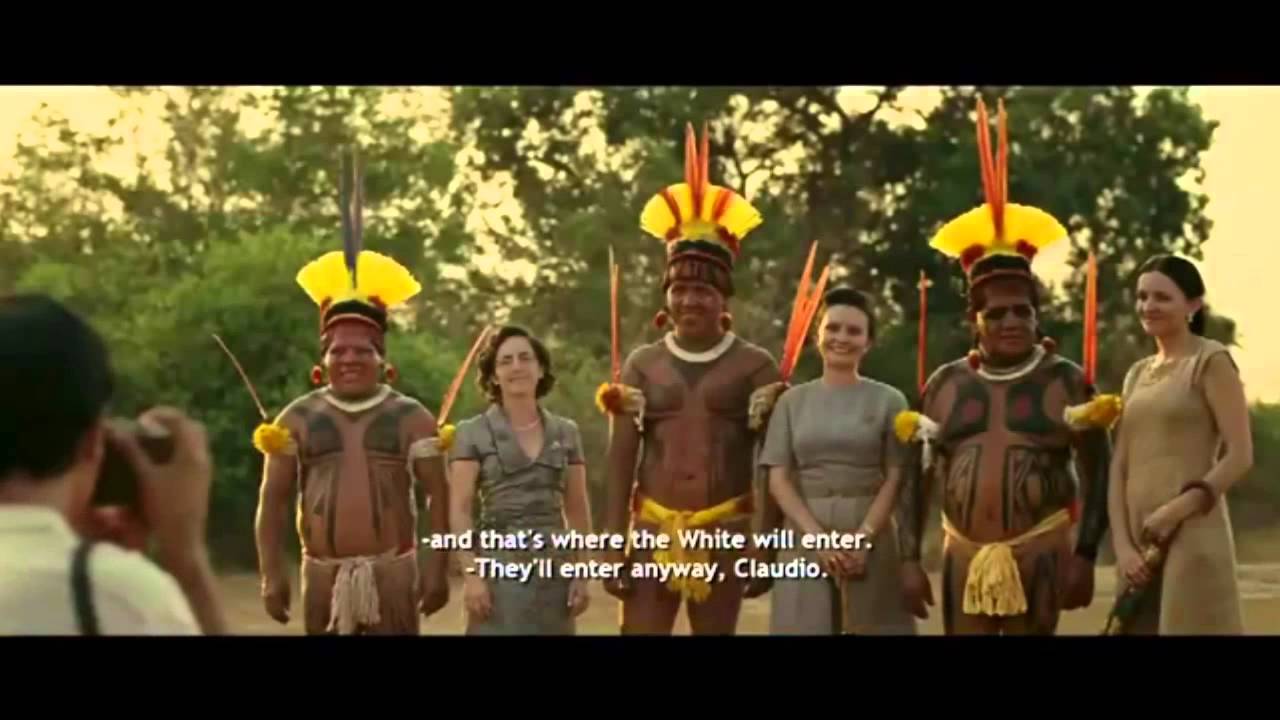YALE UNIVERSITY ▼ DEPARTMENT OF SPANISH AND PORTUGUESE
SPRING SEMESTER 2023
AFRO-LUSO-BRAZILIAN CINEMA AND SHORT FILMMAKING
MW 1:00-2:15PM
PROFESSOR PATRÍCIA LINO
[email protected] ZOOM ID: 9654492228
OFFICE HOURS: MW 11:30-12:30PM HQ 443
TF DANIELA JARA
[email protected]
NOTES
- Beyond homework, students should expect to spend an hour or more on Mondays watching a film.
- Students can choose the language of readings when available.
|
EIGHTH SEQUENCE 1] A frightened, dirty boy is looking at us. Another boy is looking at us. Another one comes, with his broken hat and sad eyes. And yet another one with messy hair and torn shirt… 2] Suddenly a fight bursts. The shots break the silence. A child, ragged and small, is frightened. A burst of gunfire makes him shiver. 3] Masses fight, fight for sadness, for that torn shirt, for those glassy eyes. Bullets are being fired and children are hungry, they know nothing. Children are sad, thin. Damn it, something must be done! FADE TO BLACK • JORGE SANJINÉS. REVOLUTION. 1979.
|
CLASS 1 // JANUARY 18, WEDNESDAY
1. Introductions
2. Syllabus, evaluations, papers and activities
3. Some notes on the history of Afro-Luso-Brazilian film
3.1. 1. Portugal
3.1.2. Aurélio Paz dos Reis (1896), Lino Ferreira (1907), Leitão de Barros (1931)
3.1.3. Experimenting under Salazar’s dictatorial rule: Manoel de Oliveira (1931)
3.1.4. Francisco Ribeiro (1942), Manoel de Oliveira (1942), Vittorio De Sica (1948)
3.1.5. Pós-74: Alfredo Tropa, João César Monteiro, and Alberto Seixas Santos
3.1.6. The 80s: Jorge Silva Melo, António Pedro Vasconcelos, and Lauro António
3.1.7. The 90s: Teresa Villaverde, Pedro Costa, and João Canijo
3.1.8. The 2000s: Miguel Gomes, Daniela Guerra, Raquel Freire, and João Pedro Rodrigues
3.2.1. Brazil
3.2.2. Vittorio di Maio (1897), Francisco Marzullo, and Antônio Leal (1908)
3.2.3. Luiz de Barros, Acabaram-se os Otários (1929)
3.2.4. 1906-1935: Mário Peixoto, Filme Cantado, Literary adaptations, Regionalist Film
3.2.5. Hollywoodescas: Carmen Miranda (1941)
3.2.6. 1947-1959, Chanchada: Walter Macedo (1949) & Oscarito
3.2.7. 1963-1970, Cinema Novo: Nelson Pereira dos Santos, Glauber Rocha, Cacá Diegues, and Joaquim Pedro de Andrade
3.2.8. Internationalizing Brazil: Fernando Meirelles (2002) and José Padilha (2008)
Recommended links
Lumière, Workers Leaving the Lumiere Factory, 1895.
Dziga Vertov, Man with a Movie Camera, 1929.
Nitty Gritty Studios, Eisenstein's Methods of Montage Explained | Montage Theory, 2017.
One Hundred Years of Cinema, Man with a Movie Camera, what makes something "Cinema"?, 2017.
Manoel de Oliveira, Douro, Faina Fluvial, 1931.
Carmen Miranda, "Hello, Hello Brazil!", 1935.
Carmen Miranda, “Aquarela do Brasil” & “You Discover You're In New York”, 1943.
Homework
1. Read:
a) Brown University Library, “Cinema Novo”, Brazil: Five Centuries of Change, 2012.
b) Glauber Rocha, “The Aesthetics of Hunger”, The Forest & The School, 2015 [1965].
DZIGA VERTOV. MAN WITH A MOVIE CAMERA. 1929.
CLASS 2 // JANUARY 23, MONDAY
1. First decolonial steps, or Introduction to Cinema Novo
1.1. Another (Intellectual) History of Brazil: Terra em Transe (1967) by Glauber Rocha
1.2. O herói sem nenhum caráter: Macunaíma (1969) by Joaquim Pedro de Andrade
Recommended links
Abertura, TV Tupi, “Glauber Rocha entrevista Luis Carlos Maciel no programa Abertura”, 1979.
Caetano Veloso & Gilberto Gil — “Cinema Novo”, Tropicália 2, 2011.
Eryk Rocha, Cinema Novo (trailer), 2016.
Austin Film Society, "Jungle Freaks: The Cinema Novo of Joaquim Pedro de Andrade", 2018.
Other recommended films
Zózimo Bulbul, Alma no Olho, 1972.
Homework
1. Finish watching Terra em Transe (1967) here and watch Macunaíma (1969) by Joaquim Pedro de Andrade here or here [you will have to subscribe the service, pay 5.00 dollars, and then cancel it.]
2. Write a two-page response paper on
a) Terra em Transe (1967) by Glauber Rocha
b) Macunaíma (1969) by Joaquim Pedro de Andrade
c) both films comparatively.
3. Send your response paper to me by email up 2h before our next class.
1. First decolonial steps, or Introduction to Cinema Novo
1.1. Another (Intellectual) History of Brazil: Terra em Transe (1967) by Glauber Rocha
1.2. O herói sem nenhum caráter: Macunaíma (1969) by Joaquim Pedro de Andrade
Recommended links
Abertura, TV Tupi, “Glauber Rocha entrevista Luis Carlos Maciel no programa Abertura”, 1979.
Caetano Veloso & Gilberto Gil — “Cinema Novo”, Tropicália 2, 2011.
Eryk Rocha, Cinema Novo (trailer), 2016.
Austin Film Society, "Jungle Freaks: The Cinema Novo of Joaquim Pedro de Andrade", 2018.
Other recommended films
Zózimo Bulbul, Alma no Olho, 1972.
Homework
1. Finish watching Terra em Transe (1967) here and watch Macunaíma (1969) by Joaquim Pedro de Andrade here or here [you will have to subscribe the service, pay 5.00 dollars, and then cancel it.]
2. Write a two-page response paper on
a) Terra em Transe (1967) by Glauber Rocha
b) Macunaíma (1969) by Joaquim Pedro de Andrade
c) both films comparatively.
3. Send your response paper to me by email up 2h before our next class.
GLAUBER ROCHA. TERRA EM TRANSE. 1967. TRAILER.
CLASS 3 // JANUARY 25, WEDNESDAY
1. Class discussion: Terra em Transe and Macunaíma
1.1. Introduction to cultural anthropophagy
1.2. Tupinambá: can the subaltern eat?
1.3. Oswald de Andrade, Tarsila do Amaral, and Mário de Andrade
1.4. New and anthropophagic recreations of Macunaíma
2. Introduction to multiple exposure, fast motion, slow motion, stop motion animations, freeze frames, match cuts, jump cuts, split screens, Dutch angles, extreme close-ups, and reversed footage.
3. First filming exercise on cuts, transitions, and movement.
Recommended links
Angelo Abu & Dan X, Macunaíma in comics, 2016.
Casa do Saber, "Terra em Transe 50 anos depois", 2017.
Iara Rennó, Macunaíma Ópera Baile, 2018.
Barca dos Corações Partidos, Macunaíma, 2020.
Homework
1. Finish your filming exercise and send it to me by email up 2h before our next class.
2. Read:
a) Ângela Campos, “We Are Still Ashamed of Our Own History. Interviewing Ex-combatants of the Portuguese Colonial War (1961-1974)”, Lusotopie, 2008.
b) Ana Balona de Oliveira, “Decolonial Imagination and the Unmaking of (Post)Colonial Cities and Tongue”, Portuguese Literary & Cultural Studies, UMass Dartmouth, Fall 2021/Spring 2022.
3. Select one of the works mentioned in the second article.
4. Write a one-page response paper about the selected artistic object.
5. Send your response paper to me by email up 2h before our next class.
FILMING EXERCISES — 1
GROUP 1 [Nicole, Aaliyah, Akweley Mazarae, Aidan, and Tina]: Video 1 & Video 2.
GROUP 2 [Meg, Saenah, Shi Wen, Colson, and Alan]: All videos.
GROUP 3 [Rebecca, Elizabeth, Jamie, Kingson, and Marly]: Video 1, Video 2, Video 3, Video 4.
GROUP 1 [Nicole, Aaliyah, Akweley Mazarae, Aidan, and Tina]: Video 1 & Video 2.
GROUP 2 [Meg, Saenah, Shi Wen, Colson, and Alan]: All videos.
GROUP 3 [Rebecca, Elizabeth, Jamie, Kingson, and Marly]: Video 1, Video 2, Video 3, Video 4.
LYGIA CLARK. CANIBALISMO. 1969.
LÍVIA MELZI. TUPI OR NOT TUPI. MUSÉE DU QUAI BRANLY. 2020. PHOTO CREDIT: LÍVIA MELZI.
CLASS 4 // JANUARY 30, MONDAY
1. First decolonial steps
1.1. The Liberation of Angola: Sambizanga (1972) by Sarah Maldoror
1.2. A (post)-colonial take on History (?): Tabu (2012) by Miguel Gomes
2. Instructions about the short film to be made by students in groups
Recommended links
AP Archive, "Angola: Portugal's Embattled Province", 1968.
CUNY TV, Sambizanga / Cinema Then, Cinema Now, 1994.
António Sousa Ribeiro; Margarida Calafate Ribeiro, "A Past that Will Not Go Away. The Colonial War in Portuguese Postmemory", Lusotopie, 2018.
Maja Figge, "Towards a caring gaze: aesthetics of decolonization in Sarah Maldoror’s Sambizanga", Journal of Communication and Languages, UNL, 2021.
Other recommended films
Stanislao Nievo, Mal D'Africa, 1967.
Manoel de Oliveira, Non, ou A Vã Glória de Mandar, 1990.
Homework
1. Finish watching Sambizanga (1972) here. [You'll have to start a 14-day free trial and then cancel it.]
2. Watch Tabu (2012) by Miguel Gomes [You'll have to login to your Yale account via CAS]
3. Write a two-page response paper on
a) Sambizanga (1972) by Sarah Maldoror
b) Tabu (2012) by Miguel Gomes
c) both films comparatively.
4. Send your response paper to me by email up 2h before our next class.
1. First decolonial steps
1.1. The Liberation of Angola: Sambizanga (1972) by Sarah Maldoror
1.2. A (post)-colonial take on History (?): Tabu (2012) by Miguel Gomes
2. Instructions about the short film to be made by students in groups
Recommended links
AP Archive, "Angola: Portugal's Embattled Province", 1968.
CUNY TV, Sambizanga / Cinema Then, Cinema Now, 1994.
António Sousa Ribeiro; Margarida Calafate Ribeiro, "A Past that Will Not Go Away. The Colonial War in Portuguese Postmemory", Lusotopie, 2018.
Maja Figge, "Towards a caring gaze: aesthetics of decolonization in Sarah Maldoror’s Sambizanga", Journal of Communication and Languages, UNL, 2021.
Other recommended films
Stanislao Nievo, Mal D'Africa, 1967.
Manoel de Oliveira, Non, ou A Vã Glória de Mandar, 1990.
Homework
1. Finish watching Sambizanga (1972) here. [You'll have to start a 14-day free trial and then cancel it.]
2. Watch Tabu (2012) by Miguel Gomes [You'll have to login to your Yale account via CAS]
3. Write a two-page response paper on
a) Sambizanga (1972) by Sarah Maldoror
b) Tabu (2012) by Miguel Gomes
c) both films comparatively.
4. Send your response paper to me by email up 2h before our next class.
SARAH MALDOROR. SAMBIZANGA. 1972. EXTRAIT.
CLASS 5 // FEBRUARY 1, WEDNESDAY
1. Class discussion: Sambizanga & Tabu
1.1. History, Power, and Silence: African Colonial War
1.2. Artistic Representations of African Colonial War
2. Class discussion: giving continuity to the conversation about the short film to be made by students in groups
Homework
1. Invest your time in spending time with your work partners and start planning your short film together.
KILUANJI KIA HENDA. A DESCOBERTA. 2007.
CLASS 6 // FEBRUARY 6, MONDAY
1. Other (de)colonial steps
1.1. Redeeming Whiteness: Vazante (2017) by Daniela Thomas
1.2. Here comes the Sertãopunk: Bacurau (2019) by Kleber Mendonça Filho
Recommended links
Hollywoodchicago.com, "Interview: Director Daniela Thomas on Vazante", 2018.
E. Bittencourt, "Interview: Kleber Mendonça Filho and Juliano Dornelles", Film Comment, 2019.
Lidia Zuin, "Decolonizing Brazil through Science Fiction: Bacurau and Brazilian Empowerment", 2022.
Other recommended films
Vitalina Varela (2019) by Pedro Costa
Homework
1. Finish watching Vazante (2017) by Daniela Thomas
2. Watch Bacurau (2019) by Kleber Mendonça Filho
3. Write a two-page response paper on
a) Vazante (2018) by Daniela Thomas
b) Bacurau (2021) by Kleber Mendonça Filho
c) both films comparatively.
4. Send your response paper to me by email up 2h before our next class.
DANIELA THOMAS. VAZANTE. 2017. FRAME + INTERVENTION IN RED.
CLASS 7 // FEBRUARY 8, WEDNESDAY
1. Class discussion: Vazante & Bacurau
1.1. Vazante
1.1.1. Greek tragedy, Self-victimization, The Study of Power
1.2. Bacurau
1.2.1. Subcidadania, Sertãopunk, Amazofuturismo
Recommended links
Marion Brockway, "Discover the New Brazilian Sci-fi with Sertãopunk", 2020.
Homework
1. Invest your time in spending time with your work partners and start planning your short film together.
KLEBER MENDONÇA FILHO. BACURAU. 2019.
CLASS 8 // FEBRUARY 13, MONDAY
1. Women of the House
1.1. Uma casa portuguesa, com certeza: Sangue do Meu Sangue (2011) by João Canijo
1.2. Com amor, Guida: The Invisible Life of Eurídice Gusmão (2019) by Karim Aïnouz
Recommended links
The Hollywood Reporter, "Blood of My Blood: Film Review", 2012.
Martha Batalha, The Invisible Life of Eurídice Gusmão, 2018.
K. Aftab, "Karim Aïnouz: Director of The Invisible life of Eurídice Gusmão", Cineuropa, 2019.
M. Elfadl, "Interview: Karim Aïnouz on “Invisible Life” and why he chose to make a melodrama", The Film Experience, filmlincdotcom, Karim Aïnouz on His Tropical Melodrama Invisible Life, 2020.
New Wave Films, The Invisible Life of Eurídice Gusmão, 2020.
Other recommended films
Casa Grande (2014) by Fellipe Gamarano Barbosa
Que horas ela volta? (2015) by Anna Muylaert
No coração do mundo (2020) by Gabriel & Maurilio Martins
Histórias das mulheres do meu país (2021) by Raquel Freire
Homework
1. Finish watching Sangue do Meu Sangue (2011) by João Canijo here [Amazon Prime; you will have to start a free subscription with Fandor and then cancel it] or here [MUBI]. Warning: the end scene of Blood of My Blood by João Canijo can be triggering. I strongly recommend you to not watch it. If you decide to follow my suggestion, stop watching the film by 1:50:00.
2. Watch The Invisible Life of Eurídice Gusmão (2019) by Karim Aïnouz.
3. Write a two-page response paper on
a) Sangue do meu sangue (2011) by João Canijo
b) The Invisible Life of Eurídice Gusmão (2019) by Karim Aïnouz.
4. Send your response paper to me by email up 2h before our next class.
1. Women of the House
1.1. Uma casa portuguesa, com certeza: Sangue do Meu Sangue (2011) by João Canijo
1.2. Com amor, Guida: The Invisible Life of Eurídice Gusmão (2019) by Karim Aïnouz
Recommended links
The Hollywood Reporter, "Blood of My Blood: Film Review", 2012.
Martha Batalha, The Invisible Life of Eurídice Gusmão, 2018.
K. Aftab, "Karim Aïnouz: Director of The Invisible life of Eurídice Gusmão", Cineuropa, 2019.
M. Elfadl, "Interview: Karim Aïnouz on “Invisible Life” and why he chose to make a melodrama", The Film Experience, filmlincdotcom, Karim Aïnouz on His Tropical Melodrama Invisible Life, 2020.
New Wave Films, The Invisible Life of Eurídice Gusmão, 2020.
Other recommended films
Casa Grande (2014) by Fellipe Gamarano Barbosa
Que horas ela volta? (2015) by Anna Muylaert
No coração do mundo (2020) by Gabriel & Maurilio Martins
Histórias das mulheres do meu país (2021) by Raquel Freire
Homework
1. Finish watching Sangue do Meu Sangue (2011) by João Canijo here [Amazon Prime; you will have to start a free subscription with Fandor and then cancel it] or here [MUBI]. Warning: the end scene of Blood of My Blood by João Canijo can be triggering. I strongly recommend you to not watch it. If you decide to follow my suggestion, stop watching the film by 1:50:00.
2. Watch The Invisible Life of Eurídice Gusmão (2019) by Karim Aïnouz.
3. Write a two-page response paper on
a) Sangue do meu sangue (2011) by João Canijo
b) The Invisible Life of Eurídice Gusmão (2019) by Karim Aïnouz.
4. Send your response paper to me by email up 2h before our next class.
JOÃO CANIJO. SANGUE DO MEU SANGUE. 2011.
CLASS 9 // FEBRUARY 15, WEDNESDAY
1. Class discussion: Sangue do meu sangue & The Invisible Life of Eurídice Gusmão
1.1. Art and Crisis: portrait(s) of a Working Class Family
1.2. Do Futureless Women Escape through Artistic Practices?
Homework
1. Watch "Why did Brazil become a Military Dictatorship?" w/ Anthony Pereira, 2021.
2. Watch "What methods did the military dictatorship in Brazil use to stay in power?" w/ Anthony Pereira, 2021.
3. Read Adriano Nervo Codato, Part 1, "Introduction: Issues of Terminology and Periodization", Sociologia Política, 2006.
4. Focus on the making of your short film.
KARIM AINOUZ. THE INVISIBLE LIFE OF EURÍDICE GUSMÃO. 2019. TRAILER.
CLASS 10 // FEBRUARY 20, MONDAY
1. To Love You Against All Odds
1.1. I was born an outlaw, that's how I'll live: Madame Satã (2002) by Karim Aïnouz
1.2. A tua vida noturna e cínica, Sérgio: O Fantasma (2000) by João Pedro Rodrigues
Other recommended films
Fantasma (2000) by João Pedro Rodrigues
A memória que me contam (2012) by Lúcia Murat
Praia do Futuro (2014) by Karim Aïnouz
Al Berto (2017) by Vicente do Alves do Ó
Piedade (2019) by Claudio Assis
Homework
1. Finish watching Madama Satã (2002) by Karim Aïnouz here [Do not be afraid of the commercials!].
2. Watch O Fantasma (2000) by João Pedro Rodrigues.
3. Write a two-page comment on
a) Madame Satã (2002) by Karim Aïnouz
b) O Fantasma (2000) by João Pedro Rodrigues
c) both films comparatively.
4. Send your response paper to me by email up 2h before our next class.
JOÃO PEDRO RODRIGUES. O FANTASMA. 2000. TRAILER.
CLASS 11 // FEBRUARY 22, WEDNESDAY
1. Class discussion: Madame Satã & O Fantasma
2. Second filming exercise: queering the lens
Homework
Finish your short film in groups. You must present it next week.
CLASS 12 // FEBRUARY 27, MONDAY
1. Exhibition of student’s short films
Students will share with the class the short films they were asked to make in groups throughout the first 7 weeks of the semester.
Each group must prepare a 10-minute presentation on the idea, techniques, and creative process of the short film.
CLASS 13 // MARCH 1, WEDNESDAY
1. Exhibition of student’s short films
Students will share with the class the short films they were asked to make in groups throughout the first 7 weeks of the semester.
Each group must prepare a 10-minute presentation on the idea, techniques, and creative process of the short film.
1. Exhibition of student’s short films
Students will share with the class the short films they were asked to make in groups throughout the first 7 weeks of the semester.
Each group must prepare a 10-minute presentation on the idea, techniques, and creative process of the short film.
CLASS 14 // MARCH 6, MONDAY
1. To Love You Against All Odds
1.1. Aquáticas: (Short film) Piscina (2016) by Leandro Goddinho
1.2. — I am in love with a woman: Rebu (2019) by Mayara Santana
1.3. Love is an Octopus: Elisa y Marcela (2019) by Isabel Coixet
Recommended links
Iris Prize, "Filmmaker Leandro Goddinho Makes a Splash with Pool", 2017.
Fernando Bers, "Water and Queer Intimacy", Space and Subjectivity in Contemporary Brazilian Cinema, 2017.
Jenna Kalishman, "Reclaiming Our Lesbian History", Filmdaze, 2019.
Other recommended films
The Portait of a Lady on Fire (2019) by Céline Sciamma
Benedetta (2021) by Paul Verhoeven
Homework
1. Watch Elisa y Marcela (2019) by Isabel Coixet.
2. Write a two-page comment on
a) Piscina (2016) by Leando Goddinho
b) Elisa y Marcela (2019) by Isabel Coixet
3. Send your response paper to me by email up 2h before our next class.
1. To Love You Against All Odds
1.1. Aquáticas: (Short film) Piscina (2016) by Leandro Goddinho
1.2. — I am in love with a woman: Rebu (2019) by Mayara Santana
1.3. Love is an Octopus: Elisa y Marcela (2019) by Isabel Coixet
Recommended links
Iris Prize, "Filmmaker Leandro Goddinho Makes a Splash with Pool", 2017.
Fernando Bers, "Water and Queer Intimacy", Space and Subjectivity in Contemporary Brazilian Cinema, 2017.
Jenna Kalishman, "Reclaiming Our Lesbian History", Filmdaze, 2019.
Other recommended films
The Portait of a Lady on Fire (2019) by Céline Sciamma
Benedetta (2021) by Paul Verhoeven
Homework
1. Watch Elisa y Marcela (2019) by Isabel Coixet.
2. Write a two-page comment on
a) Piscina (2016) by Leando Goddinho
b) Elisa y Marcela (2019) by Isabel Coixet
3. Send your response paper to me by email up 2h before our next class.
LEANDRO GODDINHO. PISCINA. 2016. TRAILER.
CLASS 15 // MARCH 8, WEDNESDAY
CLASS 16 // MARCH 27, MONDAY
1. Towards Trans Cinema
1.1. — What are you going to do, Tonia?: Morrer como um homem (2011) by João Pedro Rodrigues
1.2. The Violence of Absence: Madalena (2021) by Madiano Marcheti
Recommended links
Stephen Holden, "João Pedro Rodrigues' To Die like a Man", The New York Times, 2011.
Glenn Heath Jr., "Madalena Hauntingly Explores the Aftermath of a Trans Woman’s Death", The Film Stage, 2021.
Other recommended films
Meu amigo Cláudia (2009) by Dácio Pinheiro
Laerte-se (2017) by Eliane Brum
Bixa Travesty (2019) by Kiko Goifman and Claudia Priscilla
Indianara (2019) by Marcelo Barbosa e Aude Chevalier-Beaumel
Homework
1. Finish watching Morrer como um homem (2011) by João Pedro Rodrigues. [In case you don't have it, you'll have to start a subscription on MUBI and then cancel it.]
Watch Madalena (2021) by Madiano Marcheti.
2. Write a two-page response paper on
a) Morrer como um homem (2011) by João Pedro Rodrigues
b) Madalena (2021) by Madiano Marcheti
c) both films comparavitely.
3. Send your response paper to me by email up 2h before our next class.
MADIANO MARCHETI. MADALENA. 2021. TRAILER.
CLASS 17 // MARCH 29, WEDNESDAY
1. Class discussion: Morrer como um homem & Madalena
1.1. Clear up the terms: Travesti, Drag Queen, Trans?
1.2. Representations of the Trans Body: Tonia and Madalena
1.3. Trans Women and Patriarchy
2. Fifth filming exercise in close-up: representations of the body
Homework
1. Select the theme of your final paper.
2. Share the theme with me through email up 2h before our next class so we can work together from then on.
JOÃO PEDRO RODRIGUES. MORRER COMO UM HOMEM. 2011.
CLASS 18 // APRIL 3, MONDAY
1. Black Voices in Afro-Luso-Brazilian Filmmaking
1.1. An Enchanted Portrait: Black Orpheus (1959) by Marcel Camus
1.2. Ocupação: (Documentary) AmarElo — It's All for Yesterday (2020) by Leandro Roque de Oliveira
2. Some notes on the writing process of your final paper
Recommended links
Bosley Crowther, "Screen: Legend Retold; 'Black Orpheus' Bows at the Plaza", The New York Times, 1959.
Myrian Santos, "Black Orpheus and the Merging of Two Brazilian Nations", European Review of Latin American and Caribbean Studies, 2001.
Interview w/ Emicida, Pabllo Vittar, and Majur, 2019. [in Portuguese]
Other recommended films
Cacá Diegues, Orfeu, 1999.
Aida Marques, Abdias Nascimento, 2011. [in Portuguese]
Homework
1. Finish watching Black Orpheus (1959) by Marcel Camus.
2. Watch AmarElo — It's All for Yesterday (2020) by Leandro Roque de Oliveira.
3. Write a two-page response paper on
a) Black Orpheus (1959) by Marcel Camus
b) AmarElo — It's All for Yesterday (2020) by Leandro Roque de Oliveira.
4. Send your response paper to me by email up 2h before our next class.
ALBERT CAMUS. ORFEU NEGRO. 1959. TRAILER.
CLASS 19 // APRIL 5, WEDNESDAY
1. Class discussion: Black Orpheus & AmarElo
1.1. Some notes on the Racist Erasing of Black Intellectual Contribution to Brazil's History
1.2. Affection, Collectivity, An Interseccional Fight
2. Group discussion on each other's final papers
Homework
1. Prepare a draft of your final paper (minimum 2 pages) and turn it in next class. Information on the draft will be given in class.
EMICIDA, MAJUR & PABLLO VITTAR. AMARELO. 2020.
CLASS 20 // APRIL 10, MONDAY
1. Essa terra é nossa!
1.1. "The Guaraní-Kaiowá are survivors – survivors of ancient times": Birdwatchers (2010) by Marco Bechis
1.2. Survival Mechanisms: Xingu (2011) by Cao Hamburger
Recommended links
Tom Philips, "Birdwatchers: A Tribe's fight for justice", The Guardian, 2009.
Daniel M. Gold, "Xingu Depicts How a National Park Came to be", The New York Times, 2014.
Homework
1. Finish watching Birdwatchers (2010) by Marco Bechis
2. Watch Xingu (2011) by Cao Hamburguer.
3. Write a two-page response paper on
a) Birdwatchers (2010) by Marco Bechis
b) Xingu (2011) by Cao Hamburguer.
4. Send your response paper to me by email up 2h before our next class.
MARCO BECHIS. BIRDWATCHERS. 2010. TRAILER.
CLASS 21 // APRIL 12, WEDNESDAY
1. Class discussion: Birdwatchers & Xingu
1.1. Stories of Resistance: Guarani-Kaiowá
1.2. Villas-Boas Brothers and the Construction of Xingu Park
2. Sixth (individual) filming exercise: the land
Homework
1. Finish your individual filming exercise at home.
2. Send your filming exercise to my email up 2h before our next class.
1. Class discussion: Birdwatchers & Xingu
1.1. Stories of Resistance: Guarani-Kaiowá
1.2. Villas-Boas Brothers and the Construction of Xingu Park
2. Sixth (individual) filming exercise: the land
Homework
1. Finish your individual filming exercise at home.
2. Send your filming exercise to my email up 2h before our next class.
CAO HAMBURGUER. XINGU. 2011. SCENE.
CLASS 22 // APRIL 17, MONDAY
1. Essa terra é nossa!
1.1. Matriarcas & livres: (Documentary) As Hiper Mulheres (2012) by Carlos Fausto, Takumã Kuikuro, Leonardo Sette
1.2. O futuro sem futuro da floresta: (Documentary) The Last Forest (2021) by Luiz Bolognesi.
Recommended links
Alessandra Santos, "Itão Kuêgü–As Hiper Mulheres – The Hyperwomen by Takumã Kuikuro, Carlos Fausto, and Leonardo Sette", Hemispheric Institute, 2011.
Homework
1. Finish watching As Hiper Mulheres (2012) by Carlos Fausto, Takumã Kuikuro, Leonardo Sette.
2. Watch The Last Forest (2021) by Luiz Bolognesi.
3. Write a two-page response paper on
a) As Hiper Mulheres (2012) by Carlos Fausto, Takumã Kuikuro, Leonardo Sette
b) The Last Forest (2021) by Luiz Bolognesi.
4. Send your response paper to me by email up 2h before our next class.
1. Essa terra é nossa!
1.1. Matriarcas & livres: (Documentary) As Hiper Mulheres (2012) by Carlos Fausto, Takumã Kuikuro, Leonardo Sette
1.2. O futuro sem futuro da floresta: (Documentary) The Last Forest (2021) by Luiz Bolognesi.
Recommended links
Alessandra Santos, "Itão Kuêgü–As Hiper Mulheres – The Hyperwomen by Takumã Kuikuro, Carlos Fausto, and Leonardo Sette", Hemispheric Institute, 2011.
Homework
1. Finish watching As Hiper Mulheres (2012) by Carlos Fausto, Takumã Kuikuro, Leonardo Sette.
2. Watch The Last Forest (2021) by Luiz Bolognesi.
3. Write a two-page response paper on
a) As Hiper Mulheres (2012) by Carlos Fausto, Takumã Kuikuro, Leonardo Sette
b) The Last Forest (2021) by Luiz Bolognesi.
4. Send your response paper to me by email up 2h before our next class.
LUIZ BOLOGNESI. THE LAST FOREST. 2021.
CLASS 23 // APRIL 19, WEDNESDAY
1. Class discussion: As Hiper Mulheres & The Last Forest
1.1. Eu quero você: Itão Kuêgü, the HyperWomen
1.2. The Future of Amazónia
Homework
1. Focus on the presentation of your final paper.
CARLOS FAUSTO. AS HIPER MULHERES. 2012.
CLASS 24 // APRIL 24, MONDAY
1. Class overview
2. Pot luck + final paper presentations
Students will individually present their final paper to the class.
CLASS 25 // APRIL 26, WEDNESDAY
1. Pot luck + final paper presentations
Students will individually present their final paper to the class.
1. Pot luck + final paper presentations
Students will individually present their final paper to the class.
Course materials
All course materials will be available online.
Grading and Assignments
40% Response papers and activities
15% Short film
45% Final paper
100% Total
Grading Scale
A (93-100); A- (90-92); B+ (88-89); B (83-87); B- (80-82); C+ (78-80); C (73-77); C- (70- 72); D+ (68-70); D (63-67); F (63 and below)
Response papers, Presentation, and Final paper
Response papers and the final paper can be written in English, Portuguese, or Spanish. Presentations will be in English.
Final Paper
At the end of the quarter, students will be required to write a broader, more cumulative essay that draws on and compares artistic productions we have studied throughout the quarter. It should be a topic that allows you to relate the film(s) to larger issues involving the Afro-Luso-Brazilian cultural world. The final paper should be 10 pages long, Times New Roman, 12’ font, 1-inch margins, double-spaced. Also please email it to me [[email protected]] in WORD format by May 7 of 2023.
Attendance and participation
The course will be conducted as a student-centered seminar, in which students are expected to attend class sessions prepared to contribute to discussions. This means students are expected to complete weekly reading assignments on time. In-class participation, although somewhat subjective, is based upon your response to questions, your willingness to fully engage yourself in the task at hand, and your shown interest towards the subject matter. Above all, the key to be able to participate successfully is preparation. Students are expected to come to class with ideas and questions about the readings and films. Class participation will count significantly towards the final grade. Since we meet only twice a week, after 3 unexcused absences, the participation grade will be deduced (1 point) each time the student misses class. Moreover, students are accountable for all work missed because of an absence.
Oral presentations
Individual oral presentations (10-15 minutes) will be brief and creative reinterpretations of primary and/or secondary sources, and will be scheduled in advance.
